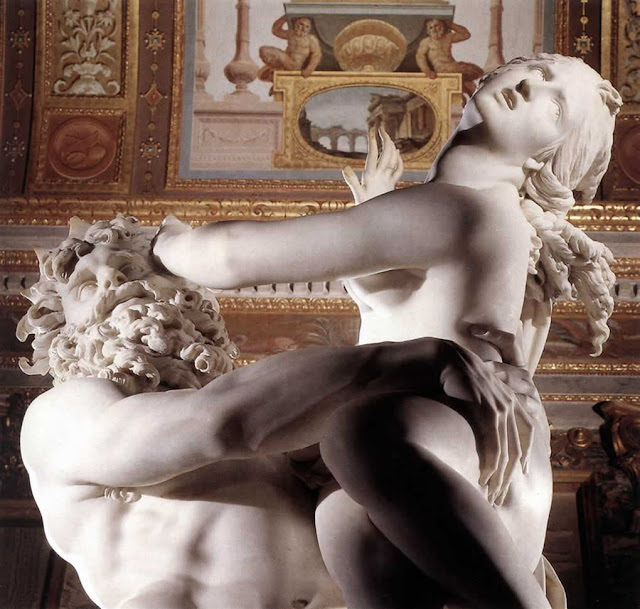Intoxication and Memory (Draft)
“I mix three kraters only for those who are wise.
One is for good health, which they drink first.The second is for love and pleasure.
The third is for sleep, and when they have drunk it those who are wise wander homewards.
The fourth is no longer ours, but belongs to hubris.
The fifth leads to shouting.
The sixth to a drunken revel.
The seventh to black eyes.
The eighth to a summons.
The ninth to bile.
The tenth to madness, in that it makes people throw things”
"But when Zeus had driven the Titans from heaven, huge Earth bare her youngest child Typhoeus of the love of Tartarus, by the aid of golden Aphrodite."
"How beautiful the coolness
Of this lovely summer night!
How the soul fills with happiness
In this true place of quiet!
I can scarcely grasp the bliss!
Yet, Heaven, I would shun
A thousand nights like this,
If my darling granted one."
Of this lovely summer night!
How the soul fills with happiness
In this true place of quiet!
I can scarcely grasp the bliss!
Yet, Heaven, I would shun
A thousand nights like this,
If my darling granted one."
An anecdote relating Goethe's drinking at wine parties suggests a figure in command of the drunken ranks as if charging through a battlefield, the commander himself immortal to the effects of the wine. This is the wealth of the festival in isolation, and also how one should conceive of the moral force - a metamorphosis, a transitional counsel, not in itself a law which must endure. It is this that Plato hints at in the law of wine, a martial law of character, and what we know of the dionysian mores - the value of each vessel in relation to health, love, and sleep. The first drink is for health, but also the third, in a higher sense and dedicated to the god. When the ivy grows within the tavern one may then exit into the night. Only a Chiron figure understands this completely, masters the 'drink of the besotted' which flows as a river from out of the mountain towards the unknown.
Hölderlin and Goethe remind us of the absolute becoming which is the law of the beautiful, "for once I lived like the gods, and no more is needed." In this exists both Achilles and Narcissus, the entire genealogy of Mount Helicon obeys the law. In beauty one approaches the infinite violence of the ephemeral.
We no longer think of beauty and morality in these terms, they are themselves laws, the becoming of eternity in itself, and he who opposes morality only succeeds in transmuting its poverty.
The drunken preliminaries of the wedding today are all that survives of its former character. What remains of Urania and Linus is as foreign to us as one who senses time in the forming of clouds and the tidal shifts of a river. We are lost to the simplest signs, so it becomes impossible to even think of the highest. The signs of nature which adorn the wedding no longer hold to its hidden law, there are no laurel crowns, the assembly does not become the strophe of Mount Helicon. The wedding hall cannot be paralyzed by the overgrowth, just as the tavern cannot see the ivy - one is prone to blind madness without the drunkenness. The black eyes and bile become permanent, yet the law remains and only strengthens its hold over us.
The law of time is most powerful in the wedding, and repeated in each season of the drinking festivities. Urania and Hymenaeus preside and deliver all to Aphrodite. "O Hymenaeus Hymen, O Hymen Hymenaeus!" The heavens cleave into the hearts of each being, and each of them equal before the rising of the earth to it. "But, bridegroom (so help me the heaven-dwellers) in no way less beautiful are you, nor does Venus slight you. But the day slips by: on! do not delay." The forwardness advances the day so that it will live on as an elemental force, that which cannot be diminished. It is this law of the heavens which acts as a guiding principle, a metamorphosis of the elements within each being - all the artistic myths speak to it, the hero is petrified within the depths of nature, given over to the heavens as a Uranian image, or flayed to live on as the wealth of these dominions wherever he may wander.
The impoverishment of art is one with its enduring, its refusal of the ephemeral nature which commands the strength of ages, the passage of time itself. The wedding festival exists in the shadow of the mountain, the caryatids guide the sight of the building, towards the law which it is a part. In the loss of time the festival character becomes permanent, then diminishes. This is true even of the highest laws, as in the Iliad wherein war must exhaust itself, in the end of heroes. Achilles is one with the City of Beauty, its end, and the age which falls as a constellation of the heroes. This is the end of dominion, where Athena, Artemis, and Hestia, the whole of the heavens become ensnared by the heart. Orion falls to the earth with Sirius, Achilles drinks his wine and begins a hunt within the ruins of the newly formed constellation. The empire falls to the hidden light, as the hero sees his enslavement to time.
Beauty is ruinous, thus one cannot curse the Muses for a coarse lie. Memory can only be a forgetting, the utmost law of art: its violence apprehends us in its finality, its end, lost as stone figures within the deepest reaches of the forest. In this is also its strength, the hidden which drives us on towards the unknown,


Comments
Post a Comment